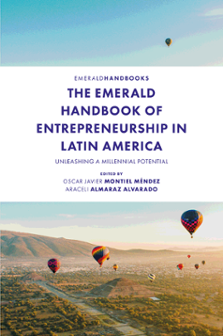
Innovation and Entrepreneurship in Latin America
The Emerald Handbook of Entrepreneurship in Latin America
ISBN: 978-1-80071-956-9, eISBN: 978-1-80071-955-2
Publication date: 23 June 2022
Citation
Libermann, N.M.L. and Nunes, A.C.B. (2022), "Innovation and Entrepreneurship in Latin America
Publisher
:Emerald Publishing Limited
Copyright © 2022 Oscar Javier Montiel Méndez and Araceli Almaraz Alvarado. Published under exclusive licence by Emerald Publishing Limited
As educators, an incredibly rewarding feeling is noticing social impact projects emerging from our students – the ones that go beyond campus and make a difference in society. This is only possible through entrepreneurial mindset development, which is not exclusively connected to new business creation.
The understanding that entrepreneurship goes beyond businesses creation has gotten increasing attention over the years. However, especially in Higher Education, embracing this concept is not easy. Many universities have business incubators or tech parks, but the idea behind them is mostly connected to the ambition of owning a business. How about those who would like to be intrapreneurs, or haven't imagined themselves as owning a company, but are willing to make an impact? In the current higher education context, entrepreneurship is a differential. It means being able to connect individual, group, and organizational competencies to societal needs. And our society needs this so much!
That was the motivation behind the creation of IDEAR, an Interdisciplinary Lab for Entrepreneurship and Innovation at the Pontifical Catholic University of Rio Grande do Sul (PUCRS) that we both helped to found. More than a project, it has been an incredible journey, that is truly connected to what motivates us in being educators.
What does it mean? IDEAR develops citizens to work in groups (soft skills). These efforts are intended to promote new solutions to local, national, or international problems (entrepreneurial competencies), regardless of their majors (interdisciplinarity). They also bring together research and teaching, public administration, civil society, and businesses in a quadruple helix model. So, it is an opportunity to foster more and more projects to change a needing society.
IDEAR was founded in 2016, tied directly to PUCRS' Dean's office. It has assisted more than __ thousands of students, coming from 50 different majors. Based on this experience, we had many learnings, such as:
Entrepreneurship has a different meaning for each student and its collective imagery in each major. For some, entrepreneurship is related to career consolidation. Other students are entrepreneurial without even knowing it.
Interdisciplinarity still has a long way to go. Disciplinary higher education structure is still hard and solid. Working with entrepreneurial competencies in a transversal manner can be an alternative to generate synergy between different knowledge areas.
Education gains much by involving the community in pedagogical proposals development. It promotes collaboration outside campus and motivates higher education students.
Creating a project can be exclusively linked to personal satisfaction. It can also be a way of proposing new professional practices or helping others, without financial ambition. There is a wide diversity of “entrepreneurship” and that makes the landscape even more beautiful.
As IDEAR leaders, we hope all students and professors can fulfill their purpose through social impact and entrepreneurship and ensure that everyone can be agents of their destiny. We do that while following our greater “why”: making a social impact through education.
- Prelims
- Section I Creativity and Entrepreneurship in Latin America
- Chapter 1 Creativity and Entrepreneurship in Latin America: The Time has Come
- Chapter 2 The Historical Institutional Context in Latin America in the Promotion of the Creativity Process of Entrepreneurship
- Chapter 3 The Orange Economy, Entrepreneurs, and the Future: The Role of Culture and Creativity in the Economic Recovery
- Chapter 4 Organizational Creativity Process: Experiences in Latin America
- Chapter 5 The Institutional Change of Intellectual Property Commercialization
- Chapter 6 Media Labs: Catalyzing Experimental, Structural, Learning, and Process Innovation
- Section II Innovation and Entrepreneurship in Latin America
- Chapter 7 Innovation in Latin America: An Eternal Recurrence?
- Chapter 8 Innovation and Entrepreneurship: The Latin American Thought
- Chapter 9 Transforming Innovation Systems for Sustainable Development Challenges: A Latin American Perspective
- Chapter 10 University Knowledge Transfer to Its Environment and STI Policies
- Chapter 11 Capabilities, Innovation, and Entrepreneurship: Startups in Latin America
- Chapter 12 Social Innovation in Latin America: Debate and Experiences
- Chapter 13 Start-Ups, Gender Disparities, and the Fintech Revolution in Latin America
- Chapter 14 Entrepreneurship Dynamics in Latin America: The Global Entrepreneurship Monitor Perspective
- Section III The Past and Future of Entrepreneurship in Latin America
- Chapter 15 A New Momentum for Entrepreneurship: Latin America's 4th Wave
- Chapter 16 An Entrepreneurial Perspective of the Mesoamerican Civilizations: Implications for Latin America
- Chapter 17 Research Priorities in Entrepreneurship in Latin America
- Chapter 18 Social Entrepreneurship, a Forceful Social Fact: An Analysis of Studies From Latin America
- Chapter 19 The Earlier Impact of COVID-19 on Entrepreneurship on Latin America: A Review and Research Agenda
- Chapter 20 A Psychological Profile of the Latin American Entrepreneur
- Chapter 21 The Potential of Biographical Studies of Latin American Entrepreneurs for Business, Economic History and Related Fields: The Cases of México and Colombia
- Chapter 22 Entrepreneurial Migration Processes From and To Latin America: Opportunities and Obstacles
- Chapter 23 A Theoretical Analysis of Entrepreneurship Education: Lessons from Mexico, Chile, and Colombia
- Chapter 24 Political Corruption and Entrepreneurship in Latin America: An Understanding of Their Interactions and the Suitability of Regional Solution Proposals
- Chapter 25 The Tourism Chain and Entrepreneurship in South America: An Overview
- Chapter 26 Analysing Successions in Family Business History: Theory and Method
- Chapter 27 Negotiation and Entrepreneurship from the Perspective of Economic Institutionalism: A Case for Latin America
- Index